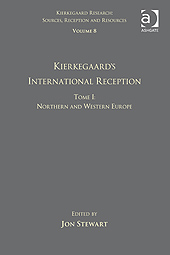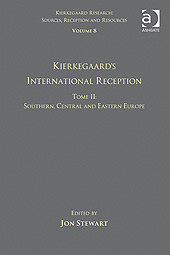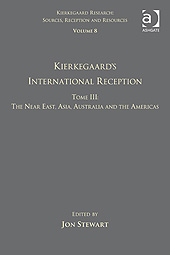
Kierkegaard Research: Sources,
Reception and Resources
|
||

  |
||

|
Volume 8:
Kierkegaard's International Reception
and the Americas
Although Kierkegaard’s reception was initially more or less limited to Scandinavia, it has for a long time now been a highly international affair. As his writings were translated into different languages his reputation spread, and he became read more and more by people increasingly distant from his native Denmark. While in Scandinavia, the attack on the Church in the last years of his life became something of a cause célèbre, later, many different aspects of his work became the object of serious scholarly investigation well beyond the original northern borders. As his reputation grew, he was co-opted by a number of different philosophical and religious movements in different contexts throughout the world. The three tomes of the present volume attempt to record the history of this reception according to national and linguistic categories.
Tome I: Northern and Western Europe
Tome I covers the reception of Kierkegaard in Northern and Western Europe. The articles on Denmark, Norway, Sweden, Finland and Iceland can be said to trace Kierkegaard’s influence more or less in its native Nordic Protestant context. Since the authors in these countries (with the exception of Finland) were not dependent on translations or other intermediaries, this represents the earliest tradition of Kierkegaard reception. The early German translations of his works opened the door for the next, broader phase of Kierkegaard’s reception. The articles in the section on Western Europe trace his influence in the German-speaking world, Great Britain, France, and the Dutch-speaking world. All of these have their own extensive tradition of Kierkegaard reception.
Table of Contents
Part I: Northern Europe Part II: Western Europe
Reviews “This book continues the Søren Kierkegaard Research Centre’s series, Kierkegaard Research: Sources, Reception and Resources. The series is the most important single collection of secondary literature on Kierkegaard to be published in recent years, and it is possibly the most important ever published. The particular contribution of this book is to trace the history of Kierkegaard’s reception in Northern and Western Europe, providing an invaluable overview of the history of scholarship in those countries that were among the first and most important to receive the philosopher. While not every chapter will be found relevant for the Anglophone world, George Pattison’s chapter on Kierkegaard’s reception in Great Britain is particularly relevant for it, with the chapters on Germany, France, and Denmark providing additional useful background. Generally, the various chapters maintain the helpful distinction between Kierkegaard’s theological and philosophical receptions, which can vary considerably. Many European movements either feel Kierkegaard’s influence or, indeed, co-opt him for their purposes, and this book traces Kierkegaard’s effect on such diverse movements as dialectical theology, philosophy of religion, the liberal Protestant tradition, existentialism, and post-structuralism…. As an aid to Kierkegaard research, nothing as comprehensive can be found in a single volume.”Will Williams, Religious Studies Review, vol. 35, no. 4, December 2009, p. 252.
Tome II: Southern, Central and Eastern Europe
Tome II covers the reception of Kierkegaard in Southern, Central and Eastern Europe. The first set of articles, under the rubric “Southern Europe,” covers Portugal, Spain, and Italy. A number of common features were shared in these countries’ reception of Kierkegaard, including a Catholic cultural context and a debt to the French reception. The next rubric covers the rather heterogeneous group of countries designated here as “Central Europe”: Hungary, the Czech Republic, Slovakia and Poland. These countries are loosely bound in a cultural sense by their former affiliation with the Habsburg Empire and in a religious sense by their shared Catholicism. Finally, the Orthodox countries of “Eastern Europe” are represented with articles on Russia, Bulgaria, Serbia and Montenegro, Macedonia, and Romania.
Part II: Central Europe
Part III: Eastern Europe
Tome III: The Near East, Asia, Australia and
Tome III is the most geographically diverse, covering the Near East, Asia, Australia and the Americas. The section on the Near East features pioneering articles on the Kierkegaard reception in Israel, Turkey, Iran, and the Arab world. The next section dubbed “Asia and Australia” features articles on the long and rich traditions of Kierkegaard research in Japan and Korea along with the more recent ones in China and Australia. A final section is dedicated to the Americas with articles on Canada, the United States, hispanophone South America, Mexico and Brazil.
Part I: The Near East
Turkey: The Reception of Kierkegaard in Turkey
The Arab World: Kierkegaard’s Arab Reception
Part II: Asia and Australia
Part III: The Americas
Canada:
Kierkegaard on the Canadian Academic Landscape
|
Kierkegard’s International
Reception
Kierkegaard’s Influence on Existentialism Kierkegaard’s Influence on Theology
Kierkegaard’s Influence on Philosophy
Kierkegaard’s
Influence on Literature and Criticism
Kierkegaard’s
Influence on the Social Sciences Kierkegaard’s Influence on Social-Political Thought
|
|
The
series Kierkegaard Research: Sources,
Reception and Resources is published Routledge Research, Philosophy
Routledge / Taylor & Francis Group, 711 Third Ave., Eighth Floor, New York, NY 10017, USA
|
||










